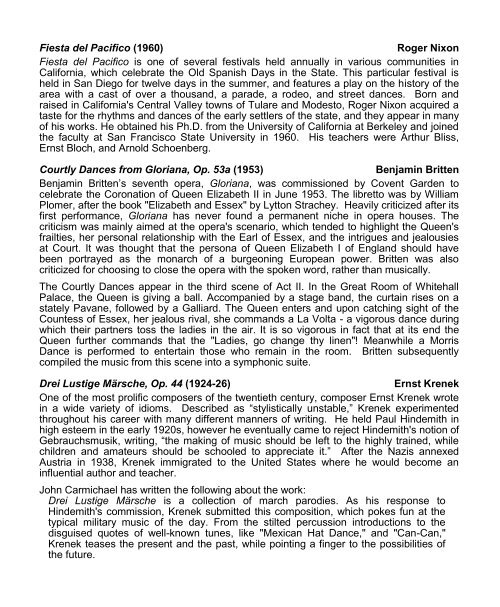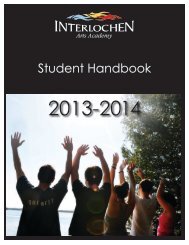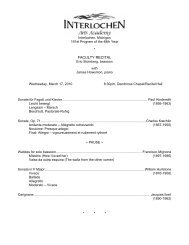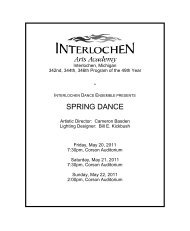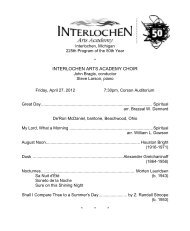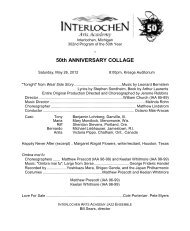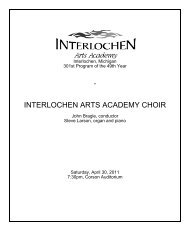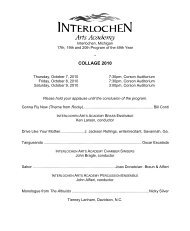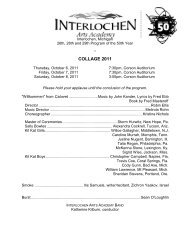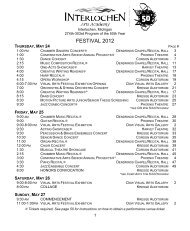13 Band 10-1.pdf - Arts Academy High School
13 Band 10-1.pdf - Arts Academy High School
13 Band 10-1.pdf - Arts Academy High School
Create successful ePaper yourself
Turn your PDF publications into a flip-book with our unique Google optimized e-Paper software.
Fiesta del Pacifico (1960) Roger Nixon<br />
Fiesta del Pacifico is one of several festivals held annually in various communities in<br />
California, which celebrate the Old Spanish Days in the State. This particular festival is<br />
held in San Diego for twelve days in the summer, and features a play on the history of the<br />
area with a cast of over a thousand, a parade, a rodeo, and street dances. Born and<br />
raised in California's Central Valley towns of Tulare and Modesto, Roger Nixon acquired a<br />
taste for the rhythms and dances of the early settlers of the state, and they appear in many<br />
of his works. He obtained his Ph.D. from the University of California at Berkeley and joined<br />
the faculty at San Francisco State University in 1960. His teachers were Arthur Bliss,<br />
Ernst Bloch, and Arnold Schoenberg.<br />
Courtly Dances from Gloriana, Op. 53a (1953) Benjamin Britten<br />
Benjamin Britten’s seventh opera, Gloriana, was commissioned by Covent Garden to<br />
celebrate the Coronation of Queen Elizabeth II in June 1953. The libretto was by William<br />
Plomer, after the book "Elizabeth and Essex" by Lytton Strachey. Heavily criticized after its<br />
first performance, Gloriana has never found a permanent niche in opera houses. The<br />
criticism was mainly aimed at the opera's scenario, which tended to highlight the Queen's<br />
frailties, her personal relationship with the Earl of Essex, and the intrigues and jealousies<br />
at Court. It was thought that the persona of Queen Elizabeth I of England should have<br />
been portrayed as the monarch of a burgeoning European power. Britten was also<br />
criticized for choosing to close the opera with the spoken word, rather than musically.<br />
The Courtly Dances appear in the third scene of Act II. In the Great Room of Whitehall<br />
Palace, the Queen is giving a ball. Accompanied by a stage band, the curtain rises on a<br />
stately Pavane, followed by a Galliard. The Queen enters and upon catching sight of the<br />
Countess of Essex, her jealous rival, she commands a La Volta - a vigorous dance during<br />
which their partners toss the ladies in the air. It is so vigorous in fact that at its end the<br />
Queen further commands that the "Ladies, go change thy linen"! Meanwhile a Morris<br />
Dance is performed to entertain those who remain in the room. Britten subsequently<br />
compiled the music from this scene into a symphonic suite.<br />
Drei Lustige Märsche, Op. 44 (1924-26) Ernst Krenek<br />
One of the most prolific composers of the twentieth century, composer Ernst Krenek wrote<br />
in a wide variety of idioms. Described as “stylistically unstable,” Krenek experimented<br />
throughout his career with many different manners of writing. He held Paul Hindemith in<br />
high esteem in the early 1920s, however he eventually came to reject Hindemith's notion of<br />
Gebrauchsmusik, writing, “the making of music should be left to the highly trained, while<br />
children and amateurs should be schooled to appreciate it.” After the Nazis annexed<br />
Austria in 1938, Krenek immigrated to the United States where he would become an<br />
influential author and teacher.<br />
John Carmichael has written the following about the work:<br />
Drei Lustige Märsche is a collection of march parodies. As his response to<br />
Hindemith's commission, Krenek submitted this composition, which pokes fun at the<br />
typical military music of the day. From the stilted percussion introductions to the<br />
disguised quotes of well-known tunes, like "Mexican Hat Dance," and "Can-Can,"<br />
Krenek teases the present and the past, while pointing a finger to the possibilities of<br />
the future.


